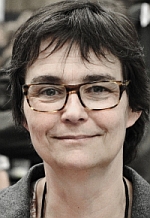Invited Talk
Susanne Bødker: Use is everywhere and changing: Analysis and design with the Human- Artifact Model

Susanne Bødker is professor of human-computer interaction at Aarhus University in Denmark. Her research focuses on computer mediated activity. She employed Activity Theory in her dissertation research, published as the book "Through the Interface" in 1990, and contributed to the broad post-cognitive rethinking of theory in HCI. She helped to establish the CSCW as a research area. She has developed and practiced participatory design methods in a wide variety of user domains from work safety inspection to public administration. Her current work is developing activity theoretical approaches to ubiquitous technologies, social navigation and community technology.
Alan Dix: Physical Beings in a Digital World
Alan is Professor of Computing at Lancaster University and researcher at Talis based in Birmingham, but, when not in Birmingham, Lancaster or elsewhere lives in Tiree a remote island of the west coast of Scotland. He has long hair, a beard and is the son of a carpenter, but thereafter all pretensions to saintliness end.
Alan began his career as a bearded mathematician at Cambridge, worked as a research scientist at the National Institute of Agricultural Engineering (lots of brightly painted tractors), a Cobol programmer for Cumbria County Council (lots of beige and brown ICL mainframes), then in 1984, thanks to Alvey, he became a bearded computer scientist. Since entering academia he worked for almost 10 years at York University before moving to become a Reader at Huddersfield in 1994, an Associate Dean of the School of Computing at Staffordshire University for two years (lots of meetings) and then Professor of Computing at Lancaster University. During all this, Alan was one of the founders and directors of two dotcom companies, aQtive (1998) and vfridge (2000) which, between them, attracted £850,000 of venture capital funding. He is also a director of LUBEL, the Lancaster University commercial exploitation company. In September 2010 he started working for Talis a semantic web company who, inter alia, provide the platform underlying the BBC and UK data.gov.uk open data initiatives.
As well as numerous articles on many aspects of human-computer interaction and related areas, Alan has written and edited several books including a big textbook on Human-Computer Interaction and a smaller textbook on Artificial Intelligence. He is currently completing a new book TouchIT on physicality and design. His interests range from formal methods to creativity, and a colleague and he are the co-inventors of intelligent lighting that is about to go into commercial production and is hoped will transform the nocturnal appearance of towns and cities across the world.
Jürgen Ziegler: Semantic Web meets UI: Context-Adaptive Interaction with Semantic Data
Jürgen Ziegler is a full professor for Interactive Systems and Interaction Design in the Department of Computer Science and Applied Cognitive Science at the University of Duisburg-Essen. Before moving to the University of Duisburg-Essen in 2003, he was head of the competence center for software technology and interactive systems at the Fraunhofer Institute for Industrial Engineering (Fraunhofer IAO) in Stuttgart. Jürgen Ziegler holds a diploma degree in electrical engineering and biocybernetics from the University of Karlsruhe and received a doctoral degree from the University of Stuttgart in the area of object-oriented development of interactive systems.
His main research interests lie in the areas of human-computer interaction, information visualisation, user interfaces for Semantic Web data and context-adaptive interaction. He has published more than 180 papers and books in the field of human-computer interaction and related areas and serves regularly in programme committees of major international HCI conferences. He has chaired and co-chaired a number of international and national conferences and workshops and has recently been co-founder of the SEMAIS workshop series on semantic models for adaptive interaction. As deputy convenor of the ISO working group on "Ergonomics of Human-System Interaction" he has been editor of international standards for multimedia and Web user interfaces. He is chair of the Special Interest Group "Methods and tools for developing interactive systems" in the German Informatics Society (GI) and editor-in-chief of i-com, the major German journal of interactive and cooperative media.